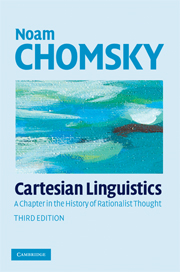Description and explanation in linguistics
Published online by Cambridge University Press: 25 January 2011
Summary
Within the framework of Cartesian linguistics, a descriptive grammar is concerned with both sound and meaning; in our terminology, it assigns to each sentence an abstract deep structure determining its semantic content and a surface structure determining its phonetic form. A complete grammar, then, would consist of a finite system of rules generating this infinite set of paired structures and thus showing how the speaker-hearer can make infinite use of finite means in expressing his “mental acts” and “mental states.”
However, Cartesian linguistics was not concerned simply with descriptive grammar, in this sense, but rather with “grammaire générale,” that is, with the universal principles of language structure. At the very outset of the work under review, a distinction was made between general and particular grammar. These are characterized by Du Marsais in the following way:
Some points [observations] of grammar apply to all languages. These form what we call general grammar – for example, those we made regarding articulated sounds and the letters which are the signs of these sounds, the nature of words and the various ways they must be ordered or terminated in order to have meaning. Apart from these general points, there are some which are peculiar to one particular language, and these form the special grammar of that language.
Beauzée elaborates the distinction in the following way:
Grammar, whose object is the expression of thought with the help of spoken or written words, comprises two sorts of principles. One sort, being immutably true and universally applicable, derive from the nature of thought itself, following its analysis and being its result. […]
- Type
- Chapter
- Information
- Cartesian LinguisticsA Chapter in the History of Rationalist Thought, pp. 93 - 97Publisher: Cambridge University PressPrint publication year: 2009



